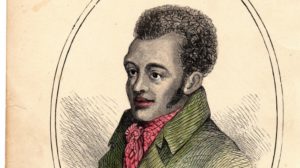‘It Was Our Theater’: 40 Years After The Harlem Burned Down, Its Memory Flickers On
(KUT Austin, NPR) On a vacant lot at the corner of East 12th and Salina streets, Ada Harden sees a silver screen where a fence now stands.
“Can you imagine a theater sitting right here?” she asks, giggling. She certainly can.
The Harlem Theater served East Austin moviegoers from 1935 until 1973, when it burned down. For those who went to the theater, it was more than just a place to watch the latest Hollywood flick.
“It really was a meeting place for people young and old and in-between,” Harden, 81, says. “It was just being at home and being comfortable and knowing no matter what happens or whatever wherever else, it’s just always comforting to know that this was here for us.” (read more)
Related: (Austin History Center) Archivist LaToya Devezin On Preserving African-American History And Culture
Can the nation’s oldest black university survive?
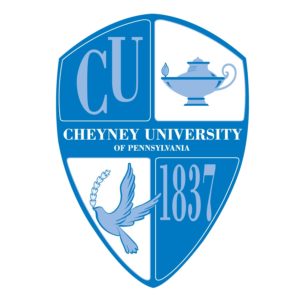 When Norma George first came to Cheyney University as an international student in the 1980s, she remembers feeling overwhelmed by the sea of students moving across campus when classes changed at 20 minutes past the hour.
When Norma George first came to Cheyney University as an international student in the 1980s, she remembers feeling overwhelmed by the sea of students moving across campus when classes changed at 20 minutes past the hour.
Today, that sea is more a trickle.
That really hadn’t registered with George, now chair of the university’s English Department and director of international programs, until one day last fall.
Standing in the student center near the snack bar over lunchtime, she waited for a flood of people, hoping to give them updates on the faculty contract situation. But the place remained empty. “Where are the students?” she asked a colleague.
With just 746 students, Cheyney’s enrollment now is less than half what it was when George was a student there.
That’s one reason students, faculty and alumni fear their university — the nation’s oldest black institution of higher education — may not have a future unless dramatic change happens.
Faculty and alumni are adamant that Cheyney is needed as much today as when it was founded in 1837 by Richard Humphreys as a place of higher learning for African Americans who were denied that opportunity elsewhere. (read more)
The 19th-Century Black Sports Superstar You’ve Never Heard Of
Who was the first African American sports superstar? Ask any boxing fan and they might tell you it was Jack Johnson, a fierce fighter who terrorized opponents on his way to becoming the first black heavyweight champion in 1908. However, 100 years before “The Galveston Giant,” there was Bill Richmond: a former slave who used both his brains and brawn to revolutionize both the sport and public perception of African Americans in general. In 2017, as part of a larger archaeological investigation of a former London burial site known as St. James’ Garden, researchers began the hunt for Richmond’s unmarked grave, in the hopes of shedding a light on this unlikeliest of sports stars.
Richmond was born into slavery on what’s today the New York borough of Staten Island on August 5, 1763. When the British landed there in 1776, at the start of the American Revolution, Richmond did what many slaves of the day did: he enlisted in the British army in exchange for the promise of freedom. As historian T.J. Desch Obi noted in the Journal of Sports History, Richmond likely came to the attention of British General Hugh Percy when, at just 13 years old, he single-handedly defeated three British soldiers who mocked him and harassed him as he tended to horses under his care. The general was so impressed with young Bill that he brought the boy back to England as a personal valet.
According to Boxing Monthly, in 1804 the 41-year-old Richmond attended a prizefight between Henry Pearce and Joe Berks. After the fight, he issued an impromptu challenge to George Maddox, considered one of the best fighters of the bare-knuckle era. Although Bill lost to the more experienced Maddox, he threw himself headlong into the sport, becoming a trainer as well as a fighter.
He returned to the ring the following year and began mowing down opponents. (read more)
TIPHC Bookshelf
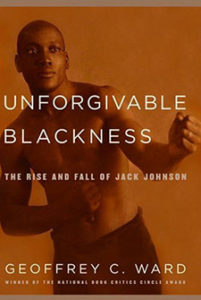 Published scholarship on black history in Texas is growing and we’d like to share with you some suggested readings, both current and past, from some of the preeminent history scholars in Texas and beyond. We invite you to take a look at our bookshelf page — including a featured selection — and check back as the list grows. A different selection will be featured each week. We welcome suggestions and reviews. This week, we offer, “Unforgivable Blackness, The Rise and Fall of Jack Johnson,” by Geoffrey C. Ward.
Published scholarship on black history in Texas is growing and we’d like to share with you some suggested readings, both current and past, from some of the preeminent history scholars in Texas and beyond. We invite you to take a look at our bookshelf page — including a featured selection — and check back as the list grows. A different selection will be featured each week. We welcome suggestions and reviews. This week, we offer, “Unforgivable Blackness, The Rise and Fall of Jack Johnson,” by Geoffrey C. Ward.
In this vivid biography Ward brings back to life the most celebrated — and the most reviled — African American of his age. Jack Johnson, a Galveston native, battled his way out of obscurity and poverty in the Jim Crow South to win the title of heavyweight champion of the world. At a time when whites ran everything in America, he took orders from no one and resolved to live as if color did not exist. While most blacks struggled simply to exist, he reveled in his riches and his fame, sleeping with whomever he pleased, to the consternation and anger of much of white America. Because he did so the federal government set out to destroy him, and he was forced to endure prison and seven years of exile. This definitive biography portrays Jack Johnson as he really was — a battler against the bigotry of his era and the embodiment of American individualism.
This Week In Texas Black History, Mar. 26-Apr. 1
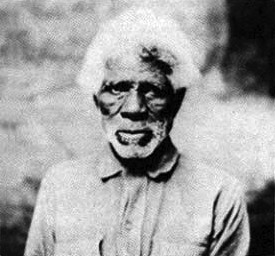 28 – This day marks the death of Congressional Medal of Honor recipient Pompey Factor in 1928 near Brackettville. Factor was a black Seminole and a former slave who served as a U.S. Army scout working with the 24th Infantry, a Buffalo Soldier regiment. He received the MOH for his actions on April 25, 1875 at Eagle’s Nest Crossing near present-day Langtry, Texas when he helped rescue unit commander Lieutenant John L. Bullis, who was under heavy fire and nearly surrounded in a skirmish with Comanche Indians.
28 – This day marks the death of Congressional Medal of Honor recipient Pompey Factor in 1928 near Brackettville. Factor was a black Seminole and a former slave who served as a U.S. Army scout working with the 24th Infantry, a Buffalo Soldier regiment. He received the MOH for his actions on April 25, 1875 at Eagle’s Nest Crossing near present-day Langtry, Texas when he helped rescue unit commander Lieutenant John L. Bullis, who was under heavy fire and nearly surrounded in a skirmish with Comanche Indians.
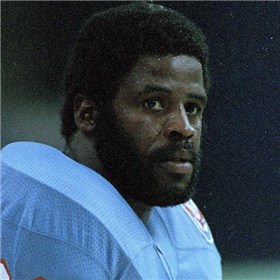 29 – Running back Earl Campbell, the first Heisman Trophy winner for the University of Texas football program, was born this day in Tyler in 1955. He attended John Tyler High School then starred for the Longhorns, becoming the first player to earn All-Southwest Conference honors four years (1974-1977). As a senior in 1977, he led the nation in rushing with 1,744 yards and was awarded the Heisman. Campbell was the first overall pick of the 1978 National Football League draft by the Houston Oilers with who he was a 1978 Rookie of the Year, three-time league Most Valuable Player, and league-leading rusher three times. In 1990, he was inducted to the College Football Hall of Fame and the following year to the Pro Football Hall of Fame. In 1981, the Texas Legislature enshrined Campbell as an Official State Hero Of Texas, an honor that had been bestowed on only three others – Davy Crockett, Stephen F. Austin, and Sam Houston.
29 – Running back Earl Campbell, the first Heisman Trophy winner for the University of Texas football program, was born this day in Tyler in 1955. He attended John Tyler High School then starred for the Longhorns, becoming the first player to earn All-Southwest Conference honors four years (1974-1977). As a senior in 1977, he led the nation in rushing with 1,744 yards and was awarded the Heisman. Campbell was the first overall pick of the 1978 National Football League draft by the Houston Oilers with who he was a 1978 Rookie of the Year, three-time league Most Valuable Player, and league-leading rusher three times. In 1990, he was inducted to the College Football Hall of Fame and the following year to the Pro Football Hall of Fame. In 1981, the Texas Legislature enshrined Campbell as an Official State Hero Of Texas, an honor that had been bestowed on only three others – Davy Crockett, Stephen F. Austin, and Sam Houston.
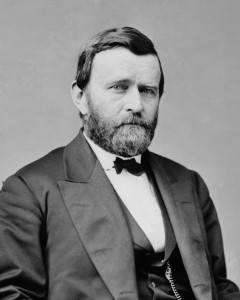 30 – On this date in 1870, President Ulysses S. Grant signed an act to readmit Texas to Congressional representation after Texas voters approved a revised state constitution, as required under the Radical Reconstruction, and elected a state government in November 1869. The new Legislature convened and ratified the 13th, 14th and 15th Amendments to the U.S. Constitution, the final requirements for readmission to the Union. The 13th Amendment outlawed slavery, the 14th granted citizenship to “all persons born or naturalized in the United States,” which included former slaves, and the 15th guaranteed black men, including freed slaves, the right to vote.
30 – On this date in 1870, President Ulysses S. Grant signed an act to readmit Texas to Congressional representation after Texas voters approved a revised state constitution, as required under the Radical Reconstruction, and elected a state government in November 1869. The new Legislature convened and ratified the 13th, 14th and 15th Amendments to the U.S. Constitution, the final requirements for readmission to the Union. The 13th Amendment outlawed slavery, the 14th granted citizenship to “all persons born or naturalized in the United States,” which included former slaves, and the 15th guaranteed black men, including freed slaves, the right to vote.
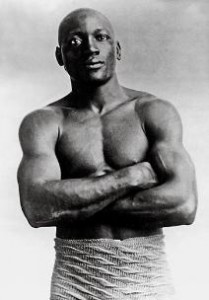 31 – On this date in 1878, boxer John Arthur “Jack” Johnson was born in Galveston. Johnson would become the first African American to win the world heavyweight title in 1908 when he defeated Tommy Burns in Sydney, Australia via decision in a 14-round bout. In 113 fights, Johnson lost only eight and is considered one of boxing’s all-time greats. Former champion Jim Jeffries came out of retirement to challenge the black champion and was billed as “The Great White Hope” when they met on July 4, 1910, in Reno, Nevada. In what was called, “The Fight of the Century,” Johnson soundly beat Jeffries. In 1990, Johnson was inducted into the International Boxing Hall of Fame.
31 – On this date in 1878, boxer John Arthur “Jack” Johnson was born in Galveston. Johnson would become the first African American to win the world heavyweight title in 1908 when he defeated Tommy Burns in Sydney, Australia via decision in a 14-round bout. In 113 fights, Johnson lost only eight and is considered one of boxing’s all-time greats. Former champion Jim Jeffries came out of retirement to challenge the black champion and was billed as “The Great White Hope” when they met on July 4, 1910, in Reno, Nevada. In what was called, “The Fight of the Century,” Johnson soundly beat Jeffries. In 1990, Johnson was inducted into the International Boxing Hall of Fame.
Blog: Ron Goodwin, Ph.D., author, PVAMU history professor
 Ron Goodwin’s bi-weekly blog appears exclusively for TIPHC. Goodwin is a San Antonio native and Air Force veteran. Generally, his column addresses contemporary issues in the black community and how they relate to black history. He and the TIPHC staff welcome your comments.
Ron Goodwin’s bi-weekly blog appears exclusively for TIPHC. Goodwin is a San Antonio native and Air Force veteran. Generally, his column addresses contemporary issues in the black community and how they relate to black history. He and the TIPHC staff welcome your comments.
Read his latest entry, “Holidays,” here.
Submissions Wanted
Historians, scholars, students, lend us your…writings. Help us produce the most comprehensive documentation ever undertaken for the African American experience in Texas. We encourage you to contribute items about people, places, events, issues, politics/legislation, sports, entertainment, religion, etc., as general entries or essays. Our documentation is wide-ranging and diverse, and you may research and write about the subject of your interest or, to start, please consult our list of suggested biographical entries and see submission guidelines. However, all topics must be approved by TIPHC editors before beginning your research/writing.
We welcome your questions or comments via email or telephone – mdhurd@pvamu.edu.

